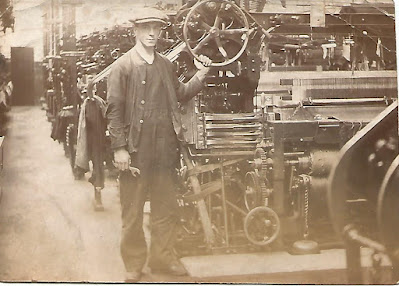The present meets the past in this account of "The Earlston Gingham Girls".
In June 2018. Janet Macintyre and Gill Cooper from Earlston SWI (Scottish Women's Institute) joined tens of thousands of women in processions in the four UK capitals, to celebrate women’s rights and commemorate the people who had fought for women to gain the vote.

 Background to the Event
Background to the Event
There had long been a campaign for the right of women to participate in the political life of the country, but it met with little success. However under the leadership of Emmeline Pankhurst, a much more militant approach was introduced with the formation of the The Women's Social and Political Union. Its activities gained notoriety in the press, leading to the term "suffragette" being coined by "The Daily Mail" in 1906.
Their first mass rally in 1908 in Hyde Park, drew crowds of over 300,000, many bearing banners specifically made for the event. The campaigners were pioneers in using visual aids to publicise their cause (what we now know as "branding") - carrying banners, proclaiming memorable slogans and adopting the colours of Green, White and Violet, reflecting their message of "Give Women Votes".
But it was the role of women in the First World War, undertaking men's work that did as much as anything to show their ability and commitment. So in November 1918 the Representation of the People Act gave the vote to some women i.e. those over the age of 30, who were householders, the wives of householders,
occupiers of property with an annual rent of £5, and graduates of
British universities. It was to be a further ten years in 1928, before women gained the vote on the same basis as men.
The 2018 Edinburgh Procession
Here is Janet and Gill's account of their experience of the procession.
"We were urged to create banners, reflecting women in our community, and to wear the Suffragette colours. Living in Earlston, we thought about the remarkable women of the village and immediately coming to mind were the Whale Sisters, the 19th century manufacturers of Earlston Gingham. We wanted to share their story in some kind of way on our banner.
We bought some green and violet gingham, with a white cloth as the background. The term "Earlston's Gingham Girls" seemed a natural title and the shape of the thistle emerged in the design, reinforcing our Scottish identity
The
Edinburgh march started from the Meadows, over George IV Bridge, down the
Mound, along Princes Street, up North Bridge and down the Royal Mile to Holyrood
Park.
We were arranged in long columns and each column was given a piece of loose woven cotton cloth in the suffragette colours. Participants tied the material around their heads, shoulders or waist and we became, a piece of street art - a flowing river of colour.
We had an amazing day - the atmosphere was friendly with a tangible air of celebration. The good weather was a bonus! Songs were sung, and stories swapped. We told as many people as we could about the significance of our banner and the achievements of the Whale sisters in a time when men dominated the business world. We returned to Earlston, happy but exhausted after carrying our banner for 3 miles around central Edinburgh.
Who were the Whale Sisters?
They
were two enterprising women who became known both nationally and internationally
for their business success.
A carved inscription on the old mill building,
with the names C & M Whale still clearly visible.
Today the site of Austin Coaches.
Contemporary press cuttings indicate how widespread was the reputation of Earlston Ginghams.
An advertisement in London's "Morning Post": 23rd September 1844.
With a reference to "the celebrated Marion Whale's Earlston ginghams."
Christian Whale died in 1862 aged 77 and "The Southern Reporter" printed a fulsome obituary, noting that "the firm employed little short of 100 weavers, who in turn required no inconsiderable number of female winders."
"The Berwickshire News" noted that she was a "woman of masculine understanding and highest business capacity......She will be long remembered in these parts as a woman of ability and enterprise and one who deserved well of her native place".
Marion died two years later. The mill was sold to the textile firm of Wilson & Sons, and the house property on the High Street was sold to Mr Smail, agent of the Commercial Bank for the sum of £700.
The two Whale sisters were ahead of their time and made an enormous contribution to Earlston life. They were beacons in mid Victorian Britain when few women showed such enterprising spirit to head successful businesses.
But they did not have the vote and had no say in political life.
Today a street name sign reminds us of the village's past.
Two surviving examples of the woven Earlston Gingham
in the collection of Auld Earlston. By chance in the suffragette colours.
*********************















